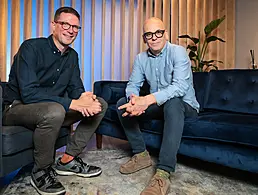No matter how common they are, general job interview questions can often be the most difficult to answer.
When it comes to interview tips, we’ve talked about some of the most common interview questions before. We’ve also talked about some of the most difficult questions to answer. Have you noticed that the two can often overlap?
Usually, with the proper preparation, candidates will be well able to answer specific questions. Even left-of-field questions can seem less scary because they are a surprise in themselves and are usually dropped in to see how well you tackle them rather than the actual answer you give.
But there’s one in particular that we can all see coming. We should be able to prepare for it, and yet it’s hard to know what really is the ‘right’ answer.
‘Where do you see yourself in five years?’
This might be reduced to three years, or expanded to 10 years (if anyone truly knows where they see themselves in 10 years, they deserve a round of applause).
No one knows what life will throw at you so, since interviewers don’t expect you to whip out a crystal ball mid-interview, what exactly are they looking for when they ask this question?
I spoke to career coach Paula Brand to find out how someone should prepare for this situation. She said it’s good to give it some thought and use your honest feelings to craft an answer, but be mindful not to accidentally eliminate yourself from the running for the role.
“In this gig economy, some candidates may have their own side business or plan to start one soon. However, generally speaking, no one can or should include this in their answer. Understandably, employers look at things from their perspective and most would see the personal business as a distraction and sometimes potential competition.”
On the flip side, Brand said if you’re interested in moving into management eventually, an easy and truthful answer could be something like: ‘My goal would be to master the key facets of this role, learn all I can about the business and hope to move into a supervisory role within the company.’
However, she also said you should be mindful of this response if it’s a very small company and there is only one management role – you might even be interviewed by that manager.
An outdated question?
Brand pointed out that it is fast becoming an outdated and irrelevant question that employers should consider scrapping from their interview. “I don’t think this is a worthwhile interview question. It’s dated, rarely receives an insightful answer and is less relevant these days,” she said. “I expect and hope that it will be asked less and less over time as companies realise the futility of it.”
She added that companies must recognise this as a personal question. “They are not likely to get 100pc honest answers because, in many cases, being too honest on this question may eliminate you from consideration.”
As it’s still a popular question among recruiters and employers, though, preparing for being asked about where you see yourself is important. If you’re not the type to plan that far ahead, Brand suggested beginning your answer with: ‘Well, I don’t think anyone can know exactly where they will be in a few years but, if things worked out well …’
She added: “This would give insight into your personality of being a realist, having some plans but not being overly attached to the future.”
Line up your goals
As this question isn’t an effective way to showcase your skills, you have to think about what the employer is really trying to find out when they ask it.
“Ideally, what they are looking for is an answer that indicates you will stick around for a while and want to grow with the company,” said Brand. “Tie the company’s stated goals with your career goals and explain how they complement each other.”
Brand said what they don’t want to hear are goals that are too unrealistic, too ambitious or too personal – especially if they involve not sticking around in the next few years.
“Ultimately, the way you present your future goals will give some indication of how you plan your life and, depending on your answer, this could illustrate a fit with the job,” she said. For example, for a project manager job, they likely want to hear the broad layout of your five-year career goals to see if you treat your future with project management principles.
“On the other hand, if the job is very creative and requires a great deal of spontaneity, sharing your month-by-month plan for the next five years might not present you as the best candidate for that job,” said Brand.
“In some ways, you could say this question is a test of your ability to navigate a challenging situation, ie how honest you can be while still telling them what they want to hear.”




